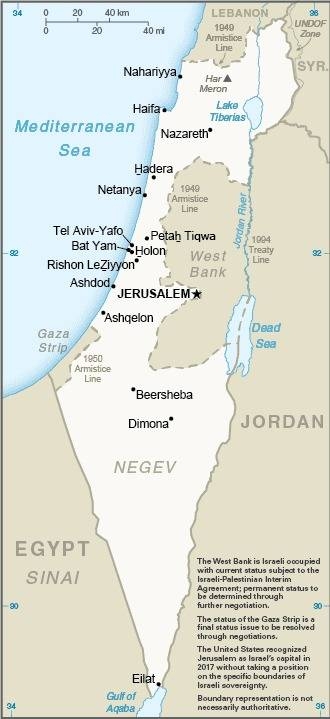144 Israel

White with a blue hexagram (six-pointed linear star, a Jewish symbol dating back to medieval times) known as the Magen David (Star of David or Shield of David) centered between two equal horizontal blue bands near the top and bottom edges of the flag. The basic design resembles a traditional Jewish prayer shawl (tallit), which is white with blue stripes.
Flag courtesy of the CIA World Factbook

Map courtesy of the CIA World Factbook

A nighttime view of Jerusalem and Israeli-occupied East Jerusalem, taken from the Mount of Olives.
Photo courtesy of the CIA World Factbook
Government
According to Britannica, Israel does not have a formal written constitution. Instead, its system of government is founded on a series of “basic laws” plus other legislation, executive orders, and parliamentary practice. The basic laws are a political compromise that serve as an alternative to a constitution. They are passed in the same way as other pieces of legislation but are intended to serve as guiding principles of the state. While it remains unclear whether the basic laws in fact hold superiority over other laws, Israel’s High Court of Justice has historically ruled against laws that have contradicted the basic laws.
The country is a democratic republic with a parliamentary system of government headed by a prime minister and involving numerous political parties representing a wide range of political positions. Israel’s lawmaking body, the Knesset, or assembly, is a single-chamber legislature with 120 members who are elected every four years (or more frequently if a Knesset vote of non confidence in the government results in an early election). Members exercise important functions in standing committees. Hebrew, the country’s official language, and Arabic, legally recognized as holding special status, are used in all proceedings.
The country’s prime minister is the head of government and is entrusted with the task of forming the cabinet, which is the government’s main policy-making and executive body. Israel has a strong cabinet, and its members may be, but need not be, members of the Knesset.
The president, who is the head of state, was traditionally elected by the Knesset for a five-year term that could be renewed only once; beginning in 2000, however, presidents were elected for a single, seven-year term. The president has no veto powers and exercises mainly ceremonial functions but has the authority to appoint certain key national officials, including state comptroller, governor of the Bank of Israel, judges, and justices of the Supreme Court.
The state comptroller, an independent officer elected by the Knesset before being appointed by the president, is responsible only to the Knesset and is the auditor of the government’s financial transactions and is empowered to inquire into the efficiency of its activities. The comptroller also acts as a national ombudsman.
Israel’s civil service gradually has become a politically neutral and professional body; previously, it tended to be drawn from, and to support, the party in power. The government’s extensive responsibilities and functions have acted to enlarge the bureaucracy.
The country is divided into 6 districts, Central, Jerusalem, Haifa, Northern, Southern, and Tel Aviv, and into 15 subdistricts. Local government consists of municipalities, local councils (for smaller settlements), or regional rural councils. The bylaws of the councils, as well as their budgets, are subject to approval by the Ministry of the Interior. Local government elections are held every five years.
Civil Aviation Authority (CAA)
The Civil Aviation Authority of the state of Israel is primarily responsible for the regulation of the civil aviation in the State of Israel in compliance with the Air Navigation rules, standards and International Conventions.
Airspace
SkyVector – Google Maps – ADS-B Exchange
ICAO countries publish an Aeronautical Information Publication (AIP). This document is divided into three parts: General (GEN), En Route (ENR) and Aerodromes (AD). ENR 1.4 details the types of airspace classes they chose to adopt from classes A through G.
Drone Regulations
Issuance of a Recreational Drone License
Advanced Air Mobility (AAM) Regulations & Policies
Bilateral agreements facilitate the reciprocal airworthiness certification of civil aeronautical products imported/exported between two signatory countries. A Bilateral Airworthiness Agreement (BAA) or Bilateral Aviation Safety Agreement (BASA) with Implementation Procedures for Airworthiness (IPA) provides for airworthiness technical cooperation between the FAA and its counterpart civil aviation authorities.
Bilateral Aviation Safety Agreement – Executive Agreement
Implementation Procedures for Airworthiness (Revision 2)
Implementation Procedures for Airworthiness (Revision 1)
Revised Export Documentation Requirement for Engines And Propellers
2016 Notification of Policy Deviation Memorandum for FAA Order 8130.21H
Obtaining Certification Approval from this Country
Advanced Air Mobility (AAM) News
2025
Video courtesy of Advanced Air Mobility Institute from the July 2025 Global AAM Forum.
2025 – AIR expands capacity with eVTOL aircraft production facility
2025 – EDAG Group to produce aircraft structure for AIR ONE
2025
Video courtesy of Advanced Air Mobility Institute from the January 2025 Global AAM Forum. Complete session for Day 3 of this Forum is available on the Advanced Air Mobility Institute YouTube Channel
2023
Short Essay Questions
Scenario-Based Question
You have been hired by a Drone Startup Company. Your boss has immediately assigned this job to you.
They need you to prepare a one-page memo detailing the legalities of using a drone to film at night in Jerusalem, pictured above.
They need you to mention any national laws and local ordinances.
They specifically want to know what airspace (insert pictures) you will be operating in and whether or not you need an airspace authorization.
Does it matter whether or not you are a citizen of the country?
Lastly, there is a bonus for you if, as you scroll through this chapter, you find any typos or broken links!
Short Essay Questions
- What are the drone categories?
- How is registration addressed?
- How is remote ID addressed?
- What are the model aircraft rules?
- What are the commercial drone rules?
- Are there waivers or exemptions to the rules? If so, for what?
- Would you share a link to an interactive airspace map?
- How is BVLOS addressed?
- How can you fly drones at night?
- How can you fly drones over people?
- Where do you find drone NOTAMs?
- What are the rules for drone maintenance?
- What are the rules for an SMS program?
- What are some unique rules not mentioned above?
- What are the C-UAS rules?
- What are the AAM rules?

